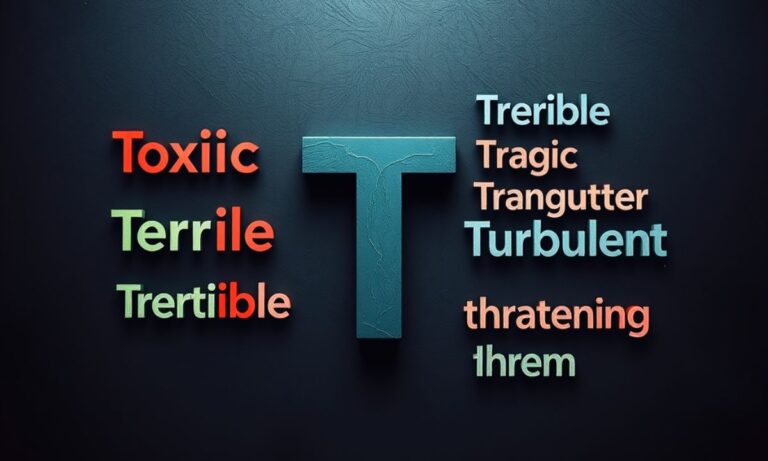The letter T provides us with an impressive array of negative words that can precisely describe various unpleasant situations, feelings, and characteristics.
From common terms like “terrible” and “tragic” to more nuanced words such as “trepidation” and “treachery,” this collection offers vocabulary that can express anything from mild disappointment to severe condemnation.
Learning these words helps writers and speakers communicate with greater precision and emotional resonance.
READ MORE: https://fashiongravity.co.uk/negative-words-that-begin-with-the-letter-e/
Torrid, Tumultuous, Toxic
These three powerful T-words exemplify the range of negative expressions available with this letter. “Torrid” describes something extremely hot, intense, or passionate, often with negative connotations suggesting discomfort or inappropriate intensity.
“Tumultuous” characterizes situations marked by confusion, disorder, and loud noise—like a chaotic crowd or a relationship filled with conflict and emotional upheaval. “Toxic” originally described poisonous substances but has evolved to describe harmful relationships, work environments, or attitudes that can damage mental and emotional wellbeing.
These words demonstrate how T-words can effectively capture various dimensions of negativity, from physical discomfort to emotional harm.
Their popularity in modern discourse shows how essential these terms have become for describing contemporary challenges in relationships, workplaces, and society.
Negative Words That Start With T
Words like “terrorism,” “threat,” and “tragedy” dominate our headlines and conversations about global events.
Other negative T-words like “traitor,” “torture,” and “trauma” describe profound betrayals, suffering, and lasting psychological damage.
“Trouble,” “trap,” and “turbulent” capture difficulties and instability in various contexts. “Tyranny” and “totalitarian” represent repressive political systems that deny freedom and basic rights.
These words help us articulate dangers, threats, and harmful actions in our discussions of personal safety, international relations, and human rights.
Understanding these terms enables more precise communication about challenging topics and contributes to important conversations about security, justice, and human dignity.
- Taboo
- Tainted
- Tantrum
- Tardy
- Tarnish
- Taunt
- Tedious
- Tense
- Terror
- Terrible
- Terrify
- Threat
- Threaten
- Throttle
- Thug
- Thwart
- Timid
- Tingling
- Tiresome
- Toil
- Tolerate
- Torment
- Torpid
- Torture
- Touchy
- Toxic
- Tragedy
- Tragic
- Traitor
- Traitorous
- Trauma
- Travesty
- Treacherous
- Treachery
- Treason
- Treasonous
- Trick
- Trickery
- Trivial
- Trouble
- Troubled
- Troublemaker
- Troublesome
- Troubling
- Truculent
- Trudge
- Turbulent
- Turmoil
- Turncoat
- Twist
- Twisted
- Tyrannical
- Tyranny
- Tyrant
- Trapped
- Trashy
- Traumatic
- Traumatize
- Trap
- Tread
- Trembling
- Tremble
- Tremor
- Trepidation
- Trial
- Tribulation
- Trickster
- Tripping
- Trounce
- Truant
- Trudging
- Trump
- Truncate
- Tumble
- Tumult
- Tumultuous
- Turbid
- Turgid
- Tussle
- Twinge
- Twitch
- Two-faced
- Two-timing
- Terrifying
- Thorny
- Throttling
- Throes
- Thrash
- Thrashing
- Thieving
- Thoughtless
- Throbbing
- Thud
- Thump
- Thumping
- Tick
- Tired
- Tiring
- Tight
- Tangled
Negative Words That Start With T To Describe A Person Or A Thing
When characterizing difficult people or unpleasant objects, T-words offer remarkable precision. “Toxic” describes not only poisonous substances but also destructive relationships—helping people identify and discuss harmful dynamics that control or abuse them.
“Temperamental” captures someone prone to unpredictable mood swings, while “trickster” describes deceptive individuals who manipulate others.
“Terrible,” “tasteless,” and “tacky” effectively convey poor quality or bad judgment in objects, art, or behavior.
“Tight-fisted” indicates someone inappropriately frugal, while “thuggish” suggests crude violence or intimidation. “Thoughtless” perfectly captures inconsiderate actions that hurt others through carelessness rather than malice.
“Tetchy” describes someone irritable and oversensitive to criticism. These descriptive words enable precise communication about problematic personality traits and disappointing experiences, helping us express frustration, disappointment, or concern with nuance.
They provide language to discuss relationship challenges, workplace difficulties, and consumer disappointments.
- Tactless
- Tainted
- Talkative (excessively)
- Tameless
- Tangled
- Tantrum-prone
- Tardy
- Tasteless
- Tattletale
- Taunting
- Tawdry
- Tedious
- Temperamental
- Temptress
- Tenacious
- Tense
- Tepid
- Terrible
- Territorial
- Terse
- Testy
- Tetchy
- Theatrical
- Thickheaded
- Thievish
- Thin-skinned
- Threatening
- Thoughtless
- Thrashy
- Thuggish
- Tight-fisted
- Timid
- Tiresome
- Tiring
- Tortuous
- Touchy
- Tough
- Toxic
- Trashy
- Treacherous
- Trivial
- Troublemaker
- Troublesome
- Truculent
- Truculent
- Tumultuous
- Turbulent
- Turgid
- Two-faced
- Tyrannical
Negative Adjectives That Start With T
Negative T-adjectives help modify nouns to express disapproval or negative qualities.
“Truculent” describes someone combative and eager to argue—like the playground bully who picks fights for dominance rather than legitimate grievances.
“Treacherous” indicates extreme danger, as demonstrated by risky activities like big wave surfing, bull fighting, and free solo climbing that pose serious risk of injury or death.
“Taciturn” describes someone unhelpfully silent or uncommunicative, while “tawdry” suggests something cheaply showy and lacking good taste.
“Tenacious” can be negative when describing someone who refuses to let go of grudges or harmful ideas. “Torpid” indicates laziness or lack of energy that prevents productivity.
“Temerous” suggests foolhardy risk-taking without proper consideration.
“Turgid” describes writing that’s unnecessarily complex and pompous. These adjectives allow precise expression of criticism, warning, or disapproval, helping identify problems in character, behavior, design, or presentation.
They provide vocabulary for constructive criticism, cautionary advice, and analytical reviews across various contexts.
- Tacky
- Tactless
- Tainted
- Tame
- Tangled
- Tantamount
- Tardy
- Tarnished
- Tasteless
- Tattered
- Tawdry
- Tedious
- Tempestuous
- Temperamental
- Temptational
- Tenacious
- Tenebrous
- Tense
- Tentative
- Tepid
- Terminal
- Terrible
- Terrifying
- Terse
- Testy
- Tetchy
- Theatrical
- Thievish
- Thin
- Thorny
- Thoughtless
- Threadbare
- Threatening
- Thrifty
- Thrilling
- Throbbing
- Throwaway
- Thuggish
- Tight
- Tight-fisted
- Timid
- Timorous
- Tinny
- Tiny
- Tiresome
- Tiring
- Tireless
- Toilsome
- Tolerable
- Torpid
- Torrid
- Torturous
- Touchy
- Tough
- Toughened
- Toxic
- Toothless
- Torn
- Totalitarian
- Touchy
- Tragic
- Traitorous
- Tranquilized
- Trapped
- Trashy
- Traumatic
- Treacherous
- Treasonous
- Trembling
- Tremulous
- Trepidatious
- Trite
- Trivial
- Troubled
- Troublesome
- Troubling
- Truculent
- Truant
- Trudging
- True-blue
- Truncated
- Trying
- Tuckered
- Tumbledown
- Tumultuous
- Turbid
- Turbulent
- Turgid
- Turned
- Twisted
- Two-bit
- Two-faced
- Two-timing
- Tyrannical
- Tyrannous
- Ugly
- Unambitious
- Uncertain
- Uncomfortable
- Unconvincing
- Tediously
- Tenaciously
- Tensely
- Terribly
- Tragically
Negative Adverbs That Begin With T
Adverbs that start with T provide crucial details about how, when, where, why, and to what extent actions occur.
“Tentatively” perfectly captures hesitant, uncertain approaches to new situations—like a child nervously entering a swimming pool for the first time before gradually building confidence.
“Tersely” describes speaking or writing in an abruptly brief manner that might seem rude. “Tiresomely” indicates something done in a way that causes fatigue or irritation.
“Tunelessly” describes poor singing or musical performance lacking proper pitch. “Tremulously” suggests action performed with anxiety and shakiness. “Tactlessly” indicates speaking without appropriate sensitivity to others’ feelings.
“Tediously” describes performing tasks in a boring, drawn-out manner. “Truculently” captures aggressive, argumentative behavior.
These adverbs enhance communication by adding precision to descriptions of problematic actions or behaviors.
They help writers and speakers convey subtle negativity through manner rather than just naming actions, creating more vivid, nuanced descriptions of troublesome behaviors and situations.
- Tactlessly
- Tastelessly
- Tautly
- Tauntingly
- Tawdrily
- Tediously
- Temperamentally
- Tempestuously
- Temptingly
- Tenaciously
- Tenebrously
- Tensely
- Tentatively
- Tepidly
- Terminally
- Terribly
- Terrifyingly
- Tersely
- Testily
- Tetchily
- Theatrically
- Thickly
- Thievishly
- Thinly
- Threateningly
- Thriftlessly
- Thrilllessly
- Throbbingly
- Thoughtlessly
- Thuggishly
- Tightly
- Timidly
- Timorously
- Tinnily
- Tirelessly
- Tiresomely
- Tiringly
- Toilsomely
- Tolerantly
- Topically
- Topplingly
- Torpidly
- Torridly
- Tortuously
- Torturingly
- Touchily
- Toughly
- Toxically
- Tragically
- Traitorously
- Tramplingly
- Traumatically
- Treacherously
- Treasonously
- Tremblingly
- Tremulously
- Trepidatiously
- Tritely
- Trivially
- Troubledly
- Troublesomely
- Troublingly
- Truantly
- Truculently
- Trudgingly
- Truncatedly
- Trying
- Tumblingly
- Tumultuously
- Turbidly
- Turbulently
- Turgidly
- Twistedly
- Two-facedly
- Tyrannically
- Tearfully
- Tenuously
- Threateningly
- Thunderously
- Twitchingly
Sad And Depressing Words That Start With T
Words beginning with T can powerfully express emotional pain and difficult experiences. “Trauma” captures profound psychological damage from terrible experiences that can cause depression years after the original event.
Mental health professionals increasingly understand how to help those suffering from trauma-related depression. “Tearful” and “tear-jerking” describe profound sadness expressed through crying or content that provokes tears.
“Tragedy” encompasses devastating events causing intense suffering, while “tragical” emphasizes the severe emotional impact. “Tenebrous” and “tenebrific” poetically describe darkness both literal and emotional.
“Threnodial” relates to songs of lamentation or mourning. “Torn-up” colloquially expresses feeling emotionally devastated.
“Two-bit” suggests something disappointingly cheap or worthless. These words help people articulate profound sadness, grief, and emotional pain, facilitating important conversations about mental health and emotional processing.
They provide vocabulary for therapeutic discussions, grief expression, and empathetic communication about difficult experiences.
- Tragic
- Tears
- Torment
- Troubled
- Trauma
- Turmoil
- Tribulation
- Treachery
- Tyranny
- Terrible
- Tearful
- Torture
- Trapped
- Trepidation
- Terminal
- Traumatized
- Tumultuous
- Trembling
- Tarnished
- Toxic
- Tension
- Threnody
- Tenebrous
- Teetering
- Thorny
- Threatening
- Tested
- Trying
- Tortuous
- Tattered
- Terminated
- Turbulent
- Tangled
- Torn
- Troubling
- Taciturn
- Trampled
- Thwarted
- Trivialize
- Tragedy
Negative T Words To Avoid
Some T-words should be avoided due to their harmful, offensive nature. “Tyrant” describes someone who rules through fear and absolute power—important to recognize but toxic to emulate in any relationship, whether political or personal.
“Transvestite” is an outdated term that should be replaced with the more respectful “transgender” when referring to someone whose gender identity differs from their birth-assigned sex.
Other terms like “towelhead,” “tits,” and various slurs beginning with T represent derogatory language that demeans specific groups based on ethnicity, gender, or other characteristics.
“Tool,” “tosser,” and “twat” function as crude insults that add little to constructive communication. Many of these terms perpetuate harmful stereotypes or reduce people to offensive caricatures.
Avoiding these words demonstrates respect for human dignity and contributes to more inclusive, constructive communication.
Understanding which terms cause harm allows speakers and writers to choose language that maintains respect while still effectively expressing negative concepts or criticisms when necessary.
- Terrible
- Toxic
- Troubled
- Traumatic
- Torment
- Treacherous
- Turbulent
- Tense
- Threatening
- Tiresome
- Tedious
- Tantrum
- Trashy
- Tactless
- Thoughtless
- Troublemaker
- Tyrannical
- Thoughtless
- Testy
- Trivial
- Trite
- Teasing
- Theft
- Traitor
- Tacky
- Treasonous
- Two-faced
- Trigger
- Temperamental
- Totalitarian
- Tantalizing
- Tasteless
- Tenuous
- Tardy
- Taboo
- Tepid
- Thwart
- Terminate
- Tragedy
- Trample
- Troublesome
- Tainted
- Trap
- Twisted
- Theoretical
- Tumultuous
- Thundering
- Timid
- Tentative
- Territorial
- Terrorize
- Thorny
- Torn
- Truncated
- Trying
- Tumult
- Tarnished
- Tight-fisted
- Treason
- Twitchy
Obscure Words That Start With T
Expanding your vocabulary with uncommon negative T-words can significantly enhance your communication.
“Traduce” means to damage someone’s reputation through lies and slander—a powerful term for discussing reputational harm more precise than general terms like “gossip.” “Tainted” describes contamination or corruption, famously used in the song “Tainted Love” to describe a harmful, toxic relationship that should be abandoned.
“Tacit” refers to something implied but not explicitly stated, while “tangential” describes something only slightly connected to the main topic. “Tenuous” indicates something weak or insubstantial, like a flimsy argument. “Tautological” describes needlessly repetitive reasoning. “Torpor” indicates a state of mental and physical inactivity.
“Trenchant” describes criticism that is sharp, incisive and effective. These words allow for more sophisticated expression of complex negative concepts, elevating writing and speech beyond common terminology.
They enable more precise, nuanced communication about sophisticated topics in fields like literature, politics, philosophy, and psychology.
- Thaumaturgy
- Tergiversate
- Triskaidekaphobia
- Tintinnabulation
- Tmesis
- Terpsichorean
- Taradiddle
- Threnody
- Torpid
- Tessellation
- Tenebrous
- Titivate
- Trichotillomania
- Tatterdemalion
- Termagant
- Tantivy
- Taphophobia
- Thimblerig
- Triboelectric
- Thalassophobia
- Thaumatolatry
- Theophany
- Tetrachromatic
- Tardigrade
- Teratogenic
- Turophile
- Theomachy
- Transmogrify
- Thalassic
- Tergum
- Thesaurus
- Trichotomy
- Temerarious
- Taphonomy
- Theologaster
- Tachyphemia
- Temerity
- Therianthropy
- Tellurian
- Tocsin
- Tumefaction
- Tergiversator
- Tabefaction
- Tacenda
- Thaumatology
- Thixotropic
- Tourbillion
- Turpitude
- Theopneusty
- Theodicy
- Tyromancy
- Tarantism
- Tautophony
- Thigmotropism
- Thelemic
- Telecentric
- Tropology
- Thanatopsis
- Traducianism
- Tautomerism
- Tropophyte
- Thermotropism
- Trophology
- Thesmothete
- Tarnation
- Thixotropy
- Thrasonical
- Tachyphagia
- Taxidermy
- Tyrocinium
- Teratism
- Tetrapyloctomy
- Tachygraphy
- Tektite
- Tohubohu
- Triturate
- Tussology
- Theanthropic
- Troglodyte
- Trilemma
Unusual Words That Begin With T
Rare T-words can add remarkable color and precision to your vocabulary.
“Tumultuous” vividly describes chaotic, disorderly situations like rowdy sports crowds that become unmanageable and potentially dangerous.
“Torrent” captures sudden, violent outpourings—whether literal like torrential rain or figurative like a torrent of abuse or emotion.
“Troglodyte” originally meant cave-dweller but now often describes someone with outdated, primitive viewpoints. “Truculent” characterizes someone belligerent and quick to fight. “Tergiversate” refers to repeatedly changing one’s position or evading commitment.
“Tuberiform” means shaped like a tuber or root vegetable. “Turriform” describes something shaped like a tower. “Turophile” means cheese lover, while “tudiculate” means to pound or beat repeatedly. “Tympaniform” describes something shaped like a drum.
These unusual words allow for extremely precise description and can enliven writing with unexpected, colorful terminology.
They provide opportunities to express complex concepts succinctly and demonstrate linguistic sophistication in academic writing, literary work, and specialized fields.
- Tergiversate
- Thaumaturgy
- Tintinnabulation
- Triskaidekaphobia
- Tmesis
- Terpsichorean
- Taradiddle
- Threnody
- Tenebrous
- Titivate
- Trichotillomania
- Tatterdemalion
- Termagant
- Tantivy
- Taphophobia
- Thimblerig
- Triboelectric
- Thalassophobia
- Thaumatolatry
- Theophany
- Tetrachromatic
- Tardigrade
- Teratogenic
- Turophile
- Theomachy
- Transmogrify
- Thalassic
- Tergum
- Temerity
- Therianthropy
- Tellurian
- Tocsin
- Tumefaction
- Tabefaction
- Tacenda
- Thaumatology
- Thixotropic
- Tourbillion
- Turpitude
- Theopneusty
- Theodicy
- Tyromancy
- Tarantism
- Tautophony
- Thigmotropism
- Thelemic
- Telecentric
- Tropology
- Thanatopsis
- Traducianism
- Tautomerism
- Tropophyte
- Thermotropism
- Trophology
- Thesmothete
- Tarnation
- Thrasonical
- Tachyphagia
- Tyrocinium
- Teratism
- Tetrapyloctomy
- Tachygraphy
- Tektite
- Tohubohu
- Triturate
- Tussology
- Theanthropic
- Troglodyte
- Trilemma
- Taciturn
- Tergiversation
- Theurgy
- Trephination
- Taphonomy
- Taxonomist
- Tessellated
- Tilth
- Truculent
- Thalassocracy
- Truckle
- Torporific
- Torsion
- Teetotum
- Tonsorial
- Torpescence
- Tantamount
- Theodolite
- Tesseract
- Thaumaturge
- Triturable
- Tachyphasia
- Typomania
- Theriomorphic
- Tragacanth
- Tatterdemallion
- Tabescent
- Thurible
- Taiaha
- Teratoid
- Tychism
- Tardigrade
- Thunderation
- Taeniacide
- Taedium
- Thalweg
- Thionic
- Trochoid
- Tubicination
- Turbary
- Tipstaff
- Tumbrel
- Thylacine
- Timocracy
- Taphephobia
- Teichopsia
- Theophagy
- Tychastic
- Terricolous
- Tristitia
- Thersitical
- Tenebrific
- Thortveitite
- Thixophobia
- Thaumatolater
- Typto
- Thanatoid
- Theosophy
- Tsessebe
- Tegestology
- Takkanah
More Negative Words That Start With T
Beyond the categories already explored, the English language offers numerous additional negative T-words worth incorporating into your lexicon.
“Tarrybangle” is an old term for a troublemaker, while “thunder-mug” was a slang term for a chamber pot. “Tartle” describes the embarrassing moment when you forget someone’s name during introductions.
“Tachythanatous” refers to causing quick death. “Toxiphobia” indicates an irrational fear of being poisoned. “Tristisonous” describes something with a sad or mournful sound.
“Tristiloquy” refers to sad or mournful speech. “Tritheism” is the heretical belief in three separate gods rather than the Trinity. “Trismus” is the medical term for lockjaw.
“Triticism” refers to a trite or commonplace expression. These additional terms further expand the range of negative concepts that can be precisely expressed using T-words.
They demonstrate the remarkable depth of English vocabulary and provide specialized terminology for various disciplines including psychology, medicine, linguistics, and rhetoric.
- Tragic
- Toxic
- Torment
- Trauma
- Tribulation
- Treachery
- Tyranny
- Trepidation
- Travesty
- Torture
- Troubling
- Threat
- Terrifying
- Tantrum
- Turmoil
- Tainted
- Terrible
- Trivial
- Theft
- Tedious
- Toil
- Tempest
- Truculent
- Terminate
- Tenuous
- Trapped
- Treason
- Tumult
- Transgression
- Tension
- Thorny
- Tumultuous
- Taxing
- Tiresome
- Treasonous
- Temper
- Tantalize
- Tacky
- Testiness
- Thwart
- Trying
- Terrorize
- Traumatized
- Tasteless
- Territorial
- Trashy
- Tarnished
- Twisted
- Taboo
- Troublemaker
- Temptation
- Timid
- Thankless
- Thoughtless
- Tactless
- Totalitarian
- Trigger
- Tough
- Treacherous
- Turbulent
FAQ’s
How Can The Use Of Negative Words Start With “T” Affect Communication?
Negative T-words can create pessimistic tone, convey criticism, evoke defensiveness, escalate conflicts, hinder problem-solving, and discourage open dialogue.
What Are The Implications Of Using Negative Words Start With “T” In Professional Settings?
In professional environments, negative T-words can undermine teamwork, create hostility, damage relationships, hinder communication, impede creativity, and decrease morale.
How Can I Be Mindful Of My Language And Minimize The Use Of Negative Words Starting With “T”?
Practice awareness of your words, pause before speaking, choose positive alternatives, show empathy, and focus on solutions rather than problems.
What are the most common negative T-words in everyday speech?
“Terrible,” “tough,” “tiresome,” “troubling,” and “tiring” appear frequently in daily conversations about challenges and difficulties.
How can understanding negative T-words improve my writing?
Knowledge of these words enhances precision, adds emotional depth, creates nuance, expands descriptive range, and helps tailor tone appropriately.
Conclusion
The extensive collection of negative T-words demonstrates the richness of the English language in expressing various shades of disapproval, difficulty, and distress.
These words provide us with precise tools to articulate everything from mild annoyance to profound trauma, enabling more effective and nuanced communication.
Understanding when and how to use these words appropriately helps us express ourselves with greater clarity and impact.
Learning these negative T-words isn’t about focusing on negativity but rather about expanding our linguistic capability to address life’s challenges with precision.
While some of these words should be avoided due to their harmful nature, most serve important functions in helping us describe problems, express emotions, and discuss difficult topics.
This vocabulary empowers us to communicate with greater sophistication, sensitivity and effectiveness across personal, professional and academic contexts.

I’m Irfan, an experienced SEO content and SEO specialist with 2 years of expertise, currently contributing to Al Jazeera News Website.





